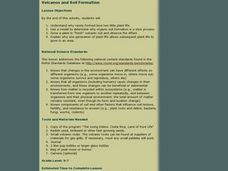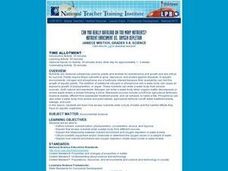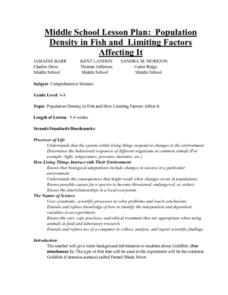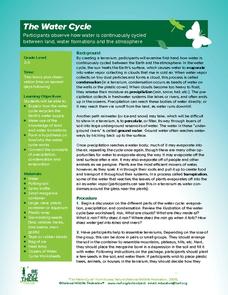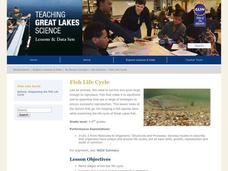Curated OER
Pollination Station
Learners investigate why and how bees pollinate flowers and other plants. They define pollination, and read and sing along with the song "Yo, i'm a Flower." Students examine a diagram of a flower, simulate bees pollinating flowers, and...
Curated OER
Why So Many Frogs?
Young scholars explain the different stages in the growth of a frog, then analyze and collect data to make generalizations about a larger population. They determine the survival rate of a population of tadpoles under controlled conditions.
Curated OER
Nutrient Enrichment vs. Oxygen Depletion
Learners investigate how excess nutrients enter a body of water, and the harmful effects they have on aquatic organisms.
Curated OER
Population Density In Fish
Students investigate how a population of fish multiplies in an ecosystem and the kinds of things that must be done to maintain a healthy population balance with other organisms that live there. They conduct an experiment to test the...
Curated OER
Genetics: Knowledge Quiz
In this genetics quiz worksheet, students complete a set of 10 multiple choice questions covering various concepts of genetics. A reference web site is given for additional resources.
Curated OER
Traveling Nitrogen
Students demonstrate and understanding of the nitrogen cycle by taking roles and interacting with others in a simulation activity.
Curated OER
Magnificent Metamorphosis
Students discover stages in metamorphosis through up close and real encounters with video, hands-on investigative and interactive activities using mealworms.
Curated OER
Biochemical Cycles: Recycling Carbon and Nitrogen
Learners construct flow diagrams of the carbon and nitrogen cycle processes. They identify sequences in each cycle that are affected by human impact and present their research to the class.
Curated OER
Coqui Frog Camouflage
Students investigate the concept of the coqui frog of Puerto Rico. They conduct research using a variety of resources. Students explain in oral or written form some of the characteristics to that identify the frog. The lesson includes...
Curated OER
Yeast - A Dihybrid Cross
Young scholars make a yeast dihybrid cross and follow two forms of each of two traits: red growth versus cream color, and tryptophan-dependent versus tryptophan-independent.
Curated OER
Renewable vs. Non-Renewable Resources
Fifth graders identify renewable vs. non-renewable resources and comprehend why conservation of resources is important. They are asked what they think the words natural and resource mean. Pupils then put the words together to define...
Curated OER
Renewable vs. Non-Renewable Resources
Fifth graders, after brainstorming why conservation of resources is important, distinguish between renewable and non-renewable resources. They make a list of different types of natural resources on the board and then sort them into two...
Curated OER
The Water Cycle
Students are introduced to the components and importance of the water cycle. They are shown how groundwater moves using a model. Students list 9 places on earth where water is found. They define the terms cycle and water cycle.
Curated OER
Marvelous Mammals- Non-Fiction Reading Comprehension Worksheets
In this mammals non-fiction reading comprehension worksheet, 3rd graders read a one page selection about the characteristics of mammals. They answer 10 questions based on the reading including true and false, short answer, and multiple...
Curated OER
Make Your Own Garden
Students explore gardening. For this Quiet in the Garden lesson plan, students read the picture book by Aliki and extend the lesson by taking part in up to 5 hands-on activities.
Curated OER
Life Cycle of Brassica Plants: Planting Seeds
Students explore botany by participating in a calendar class activity. In this plant observation lesson, students examine a diagram of a Brassica plant and identify its anatomy before planting their own seeds and viewing the changes over...
Curated OER
Lesson 3: Life Cycle of Brassica Plants
Students investigate the life cycle of brassica plants. In this science lesson, students observe each stage in the life cycle of their plant. Students record their observations and graph the data. Students
Curated OER
Volcanoes:How Safe Are They?
Young scholars explore volcanoes, locate them on maps, record general information about volcanoes, and organize information on a fact sheet.
Curated OER
What a Waste
Students analyze components of garbage. They collect and sort a few days' worth of garbage. They chart the results of an investigation.
Michigan Sea Grant
Fish Life Cycle
Fish are no different when it comes to a living being's primary objective—to reproduce. They do differ, including from fish species to fish species, in their life cycles, survival tactics and reproductive strategies. After discussion of...
Curated OER
Apoptosis: Programmed Cell Death During Development
Pupils model the plasticity of neural pathways for memory in the brain. They simulate the cell activity according to dots on cards that they are given. They complete various simulations of different cell combinations.
Curated OER
HAPPY SOIL, SAD SOIL
Students will be able to identify the characteristics of healthy soil and unhealthy soil.Take the class outside to an area of thick grass near trees, if available. Compare the
clothes people wear to the thin cover. Discuss the reasons...
Curated OER
Mollusks
In this mollusks worksheet, students will review the characteristics of the three major classes of mollusks: gastropods, bivalves, and cephalopods. This worksheet has 17 matching, 6 short answer, 9 fill in the blank, and 4 true or false...
Curated OER
More on Meiosis
In this meiosis worksheet, students fill in the blank that describes the process of meiosis. Students also draw the process of meiosis.



